

English Fairy Tales. WHO says that English folk have no fairy tales of their own?
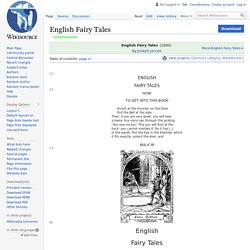
The present volume contains only a selection out of some 140, of which I have found traces in this country. It is probable that many more exist. A quarter of the tales in this volume have been collected during the last ten years or so, and some of them have not been hitherto published. Up to 1870, it was said equally of France and of Italy, that they possessed no folk-tales. Yet, within fifteen years from that date, over 1000 tales had been collected in each country. First Conditional.
Conditional Sentences Type I, II und III (Conditional Sentences, If-Clauses) Conditional Sentences are also known as Conditional Clauses or If Clauses.
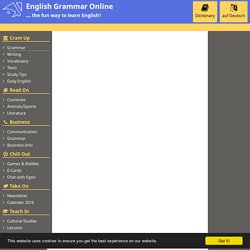
They are used to express that the action in the main clause (without if) can only take place if a certain condition (in the clause with if) is fulfilled. There are three types of Conditional Sentences. Conditional Sentence Type 1 → It is possible and also very likely that the condition will be fulfilled. The Participle Phrase. Printer Fabulous!
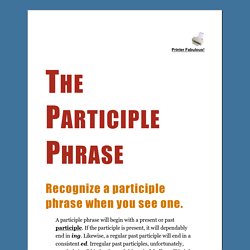
Recognize a participle phrase when you see one. A participle phrase will begin with a present or past participle. If the participle is present, it will dependably end in ing. Likewise, a regular past participle will end in a consistent ed. Irregular past participles, unfortunately, conclude in all kinds of ways [although this list will help]. Crunching caramel corn for the entire movie Washed with soap and water Stuck in the back of the closet behind the obsolete computer Participle phrases always function as adjectives, adding description to the sentence.
The horse trotting up to the fence hopes that you have an apple or carrot. So vs Such in English - An explanation of the difference with examples. The following rules explain the difference between So and Such in English.
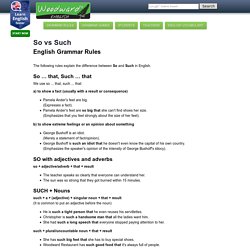
So … that, Such … that We use so ... that, such ... that: a) to show a fact (usually with a result or consequence) Pamela Ander's feet are big. Too or Enough. Also See: Too vs Enough Exercise 2 Too.
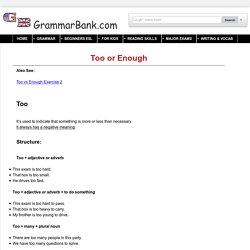
Learning English. Miscellaneous speaking worksheets.
Verb patterns: verb + infinitive or verb + - ing ? - gramática inglés en "English Grammar Today" - Cambridge University Press. Some verbs can be followed immediately by a to-infinitive: I can’t afford to go on holiday.
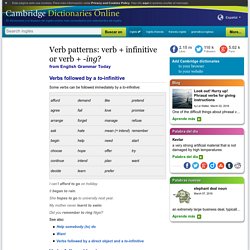
It began to rain. She hopes to go to university next year. My mother never learnt to swim. The Flatmates - Language Point 162. TO-infinitive or gerund: CONSIDER, IMAGINE. Fievel - Somewhere Out There [HD music video + lyrics] Learn To Read. Try Flo-Joe's latest weekly CAE Writing task. Writing Task (go to Checklist) Writing Paper Part 2.
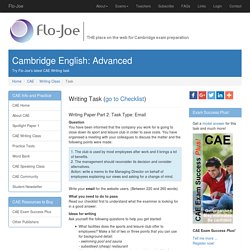
Task Type: Email Question You have been informed that the company you work for is going to close down its sport and leisure club in order to save costs. You have organised a meeting with your colleagues to discuss the matter and the following points were made: Write your email for the website users. Adjectives Vocabulary Word List. Advertisement.
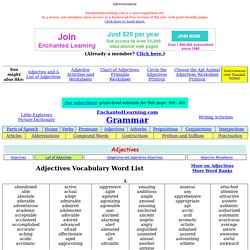
EnchantedLearning.com is a user-supported site. As a bonus, site members have access to a banner-ad-free version of the site, with print-friendly pages.Click here to learn more. (Already a member? Click here.) Related Reference Pages, Activities and Worksheets: English exercises - grammar exercises - learn English online. Forming Comparative and Superlative Adjectives. The comparison of adjectives. Difference Between As and Like. As vs Like As and Like are two words that are often confused due to the striking similarity in their usage and meanings, without paying any attention to the difference between the two words.
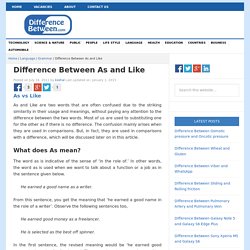
Most of us are used to substituting one for the other as if there is no difference. The confusion mainly arises when they are used in comparisons. As ... as B. As ... as A. Comparative and Superlative. Comparatives and Superlatives 1. COMPARISON. Comparative Adjectives English Lesson. In English, adjectives are used to describe things.
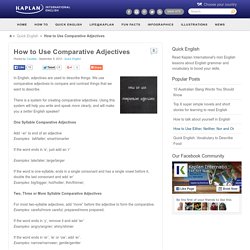
We use comparative adjectives to compare and contrast things that we want to describe. There is a system for creating comparative adjectives. Using this system will help you write and speak more clearly, and will make you a better English speaker! One Syllable Comparative Adjectives Add ‘-er’ to end of an adjectiveExamples: tall/taller; smart/smarter If the word ends in ‘e’, just add an ‘r’ ESL Quizzes - "FOR" or "SINCE" (Barbara Donnelly) CEFR Grammar levels.
Moodle - Open-source learning platform. The Present Perfect Simple Tense. The Perfect Tenses The opinion of many native and non-native English speakers is that the perfect tenses are far from being ‘perfect’. They cause headaches for most people. On these pages, we will break the perfect tenses down into short sections that will make them easier to understand. Useful Tip Time Expressions in the Present Perfect Use since with a specific year or a period in the past > since 2002 / since I was a childUse for with a number of years > for twenty yearsUse ever and yet in questions and negatives > Have you ever / hasn’t been yetUse already and never, just between have/has and the verb > has already finished / have just beenUse before, since, for, already, many times, so far, yet at the end of a sentence or questions > Have you been there before?
I wish I were… “I wish I were” and “I wish I was”: which of these is proper in English? Both are proper, they are not interchangeable, and each has a purpose. Luckily, the differences are simple. What Does “Subjunctive” Mean? “Subjunctive” refers to a “verb mood” that conveys an urgency, and it generally points to a desire or imaginary situation. This mood is most noticeable in the third person. “It is necessary that each farmer water his field and milk his cows.” These sentences illustrate an urgency, and the latter goes further with a prompt–please remove that fox so those poor chickens will not be eaten.
I Wish I Were Infographic is clickable. Grammar & vocabulary learning resources.